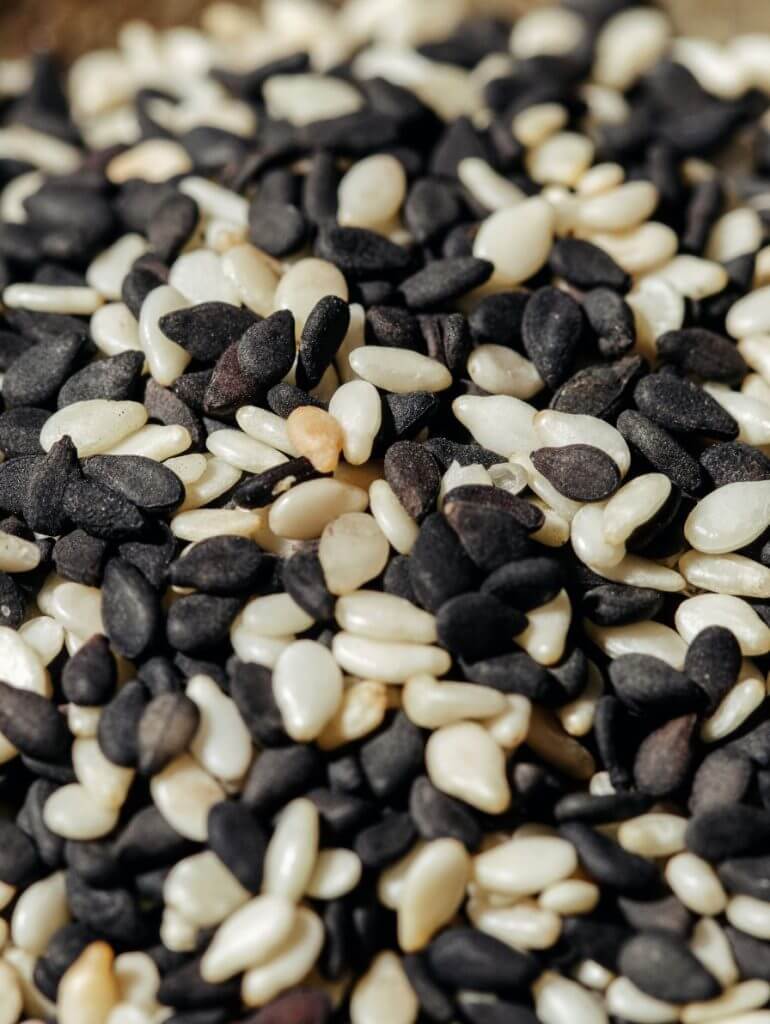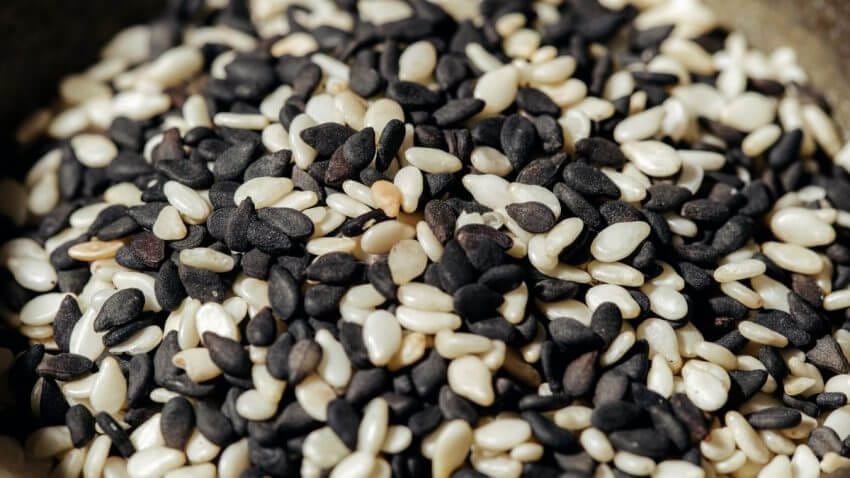Sesame seeds (Sesamum indicum) are tiny oil-rich seeds from the sesame plant, originally native to Africa and India. These nutrient-dense seeds provide 160 calories, 5.2g protein, and 273mg calcium per 28g serving. Sesame seeds support bone health, heart function, and provide essential minerals for daily nutrition.

| 🌿 Scientific Name: | Sesamum indicum |
| 🌍 Origin: | Africa and India |
| 🏆 Top Producers: | Myanmar, India, China (by tonnage, varies by year) |
| 🥄 Serving Size: | 28g (~2 tablespoons) |
| 🎨 Color: | White, black, brown, golden |
| 🌸 Taste: | Nutty, mild, slightly sweet |
| 🌱 Diet Type: | Vegan, Vegetarian |
| 📦 Shelf Life: | 6-12 months pantry, 12 months fridge, 24-36 months freezer |
What nutrients are in sesame seeds?
According to the USDA FoodData Central, sesame seeds contain 160 calories per 28g serving and are exceptionally rich in minerals and healthy fats. The nutrition profile shows high calcium, magnesium, and copper content that supports multiple body functions. Note: Hulled sesame seeds contain slightly less fiber and calcium than unhulled varieties.
| Nutrient | Per 28g | % Daily Value |
|---|---|---|
| Calories | 160 kcal | 8% |
| Protein | 5.2g | 10% |
| Total Fat | 14.6g | 19% |
| Carbohydrates | 6.9g | 3% |
| Fiber | 3.3g | 12% |
| Calcium | 273mg | 21% |
| Magnesium | 99mg | 24% |
| Copper | 1.1mg | 122% |
| Zinc | 2.2mg | 20% |
| Iron | 4.1mg | 23% |
%DV based on U.S. FDA guidelines
Hulled vs Unhulled vs Black Sesame Comparison
| Type | Calcium (mg/28g) | Fiber (g/28g) | Best Use |
|---|---|---|---|
| Unhulled White | 273mg | 3.3g | Maximum nutrition |
| Hulled White | 245mg | 2.9g | Smooth texture recipes |
| Black Sesame | 290mg | 3.5g | Higher antioxidants |
What are the health benefits of sesame seeds?
Sesame seeds provide multiple evidence-based health benefits through their rich mineral and antioxidant content. According to USDA data, these seeds support immune system function through zinc, selenium, copper, iron, vitamin B6, and vitamin E that work together for optimal health.
- Bone Health Support: Sesame seeds are an excellent source of manganese and calcium, both of which help bones grow healthy and strong. The 273mg calcium per serving supports bone density and may help prevent osteoporosis.
- Heart Health Protection: Sesame seeds contain calcium and magnesium, which may help reduce blood pressure and support blood vessel health. The magnesium content supports cardiovascular function. Use our heart health calculator to track your nutrient intake.
- Cholesterol Management: Research shows sesame seeds contain the highest total phytosterol content among nuts and seeds, with 202 milligrams per ounce (28 grams), which potentially helps block cholesterol absorption.
- Immune System Support: The high zinc content (20% DV) supports white blood cell function and helps the body recognize harmful microbes. Calculate your zinc intake for immune support.
- Antioxidant Activity: Sesame seeds contain lignans like sesamin and sesamolin that provide potential antioxidant, anti-inflammatory effects that may benefit overall health.
What types of sesame seed varieties exist?
Sesame seeds come in several distinct varieties that differ in color, flavor intensity, and culinary applications. Each variety maintains similar nutritional profiles while offering unique characteristics for different uses.
White Sesame Seeds: Most common variety with mild, nutty flavor. Used in baking, tahini production, and general cooking. Hull-on versions provide more fiber and calcium.
Black Sesame Seeds: Stronger, more intense flavor with higher antioxidant content. Popular in Asian cuisine and traditional medicine. Contains more lignans and phytochemicals than white varieties.
Hulled Sesame Seeds: White seeds with outer hull removed for smoother texture. Lower in fiber and calcium but easier to digest. Commonly used in commercial food production.
Tahini Sesame Seeds: Hulled seeds specifically processed for tahini and sesame butter production. Selected for optimal oil content and smooth grinding properties.
How do you choose and store sesame seeds?
Quality sesame seeds should appear uniform in color, smell fresh and nutty, and feel dry to the touch. Avoid seeds that look discolored, smell rancid, or show signs of moisture damage. Check our food freshness quality checker for detailed selection tips.
Selection Tips: Choose organic when possible, check expiration dates, and buy from reputable suppliers. Whole seeds with hulls provide more nutrients than hulled varieties.
Storage Steps:
- Store in airtight containers in cool, dry places away from direct sunlight
- Refrigerate opened packages to extend freshness for up to 12 months
- Freeze for long-term storage up to 24-36 months without quality loss
- Keep away from strong odors as sesame seeds absorb flavors easily
- Toast small quantities as needed since toasted seeds lose freshness faster
Use our shelf life estimator to track storage duration and freshness.
Do sesame seeds expire?
Properly stored sesame seeds maintain quality for 6-12 months at room temperature, though oil content may cause rancidity if exposed to heat, light, or moisture.
How much sesame seeds should you eat daily?
According to nutritional guidelines, the recommended daily serving of sesame seeds is 1-2 tablespoons (14-28g) for most adults, providing substantial nutrients without excessive calories. This amount delivers significant calcium, magnesium, and healthy fats for optimal nutrition.
| Age Group | Daily Serving | Amount (g) | Key Benefits |
|---|---|---|---|
| Children (2-6 years) | 1 teaspoon | 5g | Growth support, introduce gradually |
| Children (6-12 years) | 1-2 teaspoons | 5-10g | Bone development, energy |
| Teenagers (13-18 years) | 1 tablespoon | 14g | Growth, bone density |
| Adults (19-64 years) | 1-2 tablespoons | 14-28g | Heart health, mineral intake |
| Elderly (65+ years) | 1-2 tablespoons | 14-28g | Bone health, nutrient density |
| Pregnant Women | 1-2 tablespoons | 14-28g | Calcium, folate support |
Calculate personalized portions using our portion size recommender based on your specific nutritional needs.
Is roasting sesame seeds healthy?
Roasting enhances flavor and digestibility while slightly reducing some heat-sensitive vitamins, but maintains most mineral content and may improve antioxidant bioavailability.
Should you soak sesame seeds?
Soaking for 4-8 hours improves digestibility and nutrient absorption, particularly for people with sensitive digestive systems, though it’s not necessary for most individuals.
Who should eat sesame seeds and who should avoid them?
Sesame seeds benefit most people, especially those seeking plant-based calcium sources, heart health support, and immune system enhancement. However, certain individuals should exercise caution or avoid consumption entirely.
Target Groups: Vegetarians and vegans seeking calcium alternatives, adults with osteoporosis risk, people with high cholesterol, and those wanting natural antioxidant sources. Explore bone health nutrients for comprehensive mineral support.
Contraindications: Individuals with sesame allergies must avoid completely. People with diverticulitis should consult healthcare providers before consuming whole seeds. Those taking blood-thinning medications should moderate intake due to vitamin K content.
Are sesame seeds safe for children?
Yes, when introduced after 12 months and monitored for allergic reactions, as sesame is among the top 9 allergens requiring careful introduction.
Can you eat sesame seed hulls?
Yes, hulls are edible and provide additional fiber and minerals, though some people prefer hulled seeds for smoother texture in recipes and easier digestion.
What are interesting facts about sesame seeds?
Sesame seeds hold the distinction of being one of humanity’s oldest cultivated crops, with fascinating cultural and nutritional significance spanning thousands of years across multiple civilizations.
The phrase “Open Sesame” from Arabian Nights refers to sesame seed pods that burst open when ripe, releasing their treasured contents. Ancient Babylonians used sesame oil in religious ceremonies over 4,000 years ago.
Sesame plants can survive in drought conditions where other crops fail, making them valuable for sustainable agriculture. The seeds contain lignans like sesamin and sesamolin that provide unique health benefits not found in other seeds.
Black sesame seeds were considered so valuable in ancient China that they were used as currency for trade. Modern research shows sesame seeds have higher antioxidant capacity than many common nuts and seeds.
How much do sesame seeds cost?
Sesame seed prices vary significantly based on variety, quality, and processing method, with organic and specialty varieties commanding premium prices. Current market rates reflect global supply and demand dynamics.
Price Ranges: Conventional white sesame seeds cost $3-5 per pound, while organic varieties range $6-8 per pound. Black sesame seeds typically cost 20-30% more than white varieties due to lower production volumes.
Comparative Context: Sesame seeds cost less than most tree nuts but more than sunflower seeds. Bulk purchasing reduces costs significantly. Use our cost per serving calculator to compare value across different seed options.
FAQ related to Sesame Seeds
Are sesame seeds a nut or a fruit?
Sesame seeds are neither nuts nor fruits – they are seeds from the sesame plant (Sesamum indicum). Botanically, they develop from flowers and are classified as oilseeds, similar to sunflower seeds and pumpkin seeds.
Can you eat raw sesame seeds?
Yes, raw sesame seeds are completely safe and nutritious to eat. Raw seeds retain maximum vitamin E and delicate oils, though toasting improves digestibility and enhances nutty flavor for many recipes.
Are sesame seeds good for weight loss?
Sesame seeds support weight management through high protein and fiber content that promote satiety, though their caloric density (160 calories per 28g) requires portion control for weight loss goals. Track your intake with our calorie calculator.
Are sesame seeds safe for diabetics?
Yes, sesame seeds have low glycemic impact and may help regulate blood sugar levels. The magnesium content supports insulin sensitivity, making them suitable for diabetic meal plans in appropriate portions. Use our glycemic load calculator for personalized guidance.
Can Dogs/Cats eat sesame seeds?
Dogs can eat small amounts of plain sesame seeds safely, but cats should avoid them as they may cause digestive upset. Always introduce gradually and avoid seasoned varieties containing garlic or salt.
Are sesame seeds high in cholesterol?
No, sesame seeds contain zero cholesterol as plant foods never contain dietary cholesterol. Instead, their phytosterols actively help reduce cholesterol absorption and support heart health through lipid profile benefits.
Are sesame seeds anti-inflammatory?
Yes, sesame seeds contain lignans, vitamin E, and magnesium that may provide anti-inflammatory effects. Regular consumption potentially helps reduce inflammatory markers and supports overall health through antioxidant activity.
Are sesame seeds better than almonds?
Sesame seeds excel in calcium (273mg vs 76mg per 28g) and copper content, while almonds provide more vitamin E and protein. Both offer unique nutritional benefits for different health goals and dietary needs. Compare them using our comparison tool.
